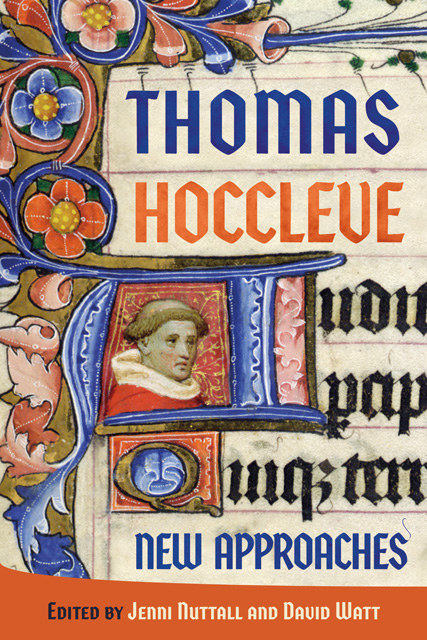11 - Reading Through: Major/Minor Hoccleve
Published online by Cambridge University Press: 11 January 2023
Summary
In his final years, Thomas Hoccleve compiled the two manuscripts of his shorter poems now housed at the Huntington Library in San Marino, California: MSS HM 111 and 744. The manuscripts evince a conservative impulse, an effort to preserve a range of material composed over Hoccleve’s lifetime. Of the twenty-nine pieces included therein, only nine survive in other manuscripts from the period. The earliest firmly datable poem in the manuscripts is L’epistre de Cupide, recorded, within the poem, as having been written in May 1402. Another piece, Hoccleve’s translation and adaptation of the ars moriendi chapter from Henry Suso’s Horologium sapientiae, is also found in Hoccleve’s Series, completed between 1421 and 1426. The Huntington holographs follow a trend put in place by Hoccleve’s predecessor Chaucer with his own Canterbury Tales collection: the use of one’s final years to gather up the leaves of a life’s work, offer whatever order is possible, and send them into the world.
The contents themselves are truly various. While thematic connections do sometimes occur – such as between the first six items in HM 744, all religious poems, the first three of which are invocations in turn to God, Christ, and the Holy Spirit – there is no overarching narrative, and little by way of transitions between texts. In the same four-year span that Hoccleve was compiling the Huntington holographs (1422–26), he was also at work on the Durham Series and his Formulary. The latter is a book of forms intended for the use of future scribes in the office of the Privy Seal. The Huntington holographs give a similar impression to the Formulary: they serve as a collection of poetic forms, exhibiting the writer’s expertise in a variety of modes, from petitionary verse to poems of Marian devotion, ars moriendi, Cupid poetry, envoi, autobiographical verse, admonitions against heresy, and dedicatory verses.
The collections also raise the question of how Hoccleve’s poems, long and short, ‘major’ and ‘minor’, work in parallel. Reading Hoccleve’s shorter poems alongside his two longer works presents the reader with an opportunity to consider how a certain rhetorical strategy or narrative approach is reimagined in a different situation, or how a given word, even, can be transplanted from one rhetorical environment into another.
- Type
- Chapter
- Information
- Thomas Hoccleve New Approaches , pp. 230 - 248Publisher: Boydell & BrewerPrint publication year: 2022



